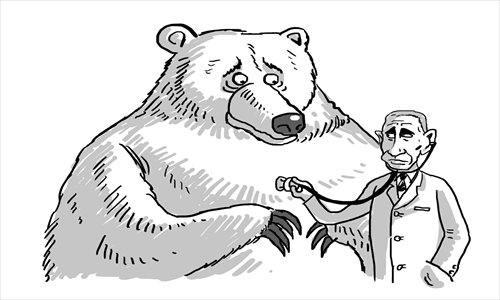Putin imposes own brand of democracy

Russia has carried out a series of political reform measures under newly reelected President Vladimir Putin, in response to protests seen during the presidential election. Meanwhile, Putin has enhanced his control over public politics. The essence of Putin's "managed democracy" remains unchanged. The first step to realize Putin's political reform promise was to pass a law to simplify procedures for registering political parties.
The new law took effect on April 4, 2012, which greatly ignited society's passion for participating in politics. Within a few months, there have been hundreds of politicial party preparatory committees filing applications. By mid-December, the number of registered parties had increased to 48, including seven from before the new law.
The second step is that the Russian Duma passed a law on direct elections for state governors on April 25, 2012.
Under the new law, Russian citizens above 30 years old are eligible. They can be nominated by a particular party or stand as independents. The president will be able to sack governors for corruption or over other conflicts of interest.
The third is to ease the restriction on political parties to take part in elections and ease the qualifications for presidential candidates. The threshold for support signatures for non-parliamentary presidential candidates of political parties has been lowered from 2 million to 100,000.
Russia's political reform has been open in terms of format, but generally, these reform measures will have no real impact on the country's political structure. The prospects for those newly established parties are dim, and they can hardly influence the existing status quo.
Political power at local levels will remain under control of Putin's United Russia party. Most current governors will end their terms after 2015. New laws set selection procedures by the president and regional parliament. Besides, given that the passion of the Russian people to get involved in politics is not that high, direct elections for local governors will generate no variables to concern.
Putin has taken measures after street protests which challenged his authoritativeness and threatened social stability.
The first measure is the amendments to the Federal Law on Gatherings, Rallies, Demonstrations, Protests, and Pickets that took effect on June 9, 2012. The act has regulated procedures for applying to hold public gatherings and detailed punishment for violations. The act's timely issue allowed the peaceful ending up of the gatherings involving millions of citizens by opposition parties on June 12, 2012.
The second is the approved legislation by the Duma that blocks blacklisted websites. The law officially seeks to combat websites that carry child pornography, incite violence or create conflicts among different ethnic groups.
The third measure concerns non-profit organizations. Politically active non-profit organizations in Russia that receive financial support from abroad will be classified as "foreign agents" and will be listed in a designated registry. They will be required to submit special reports and subject to discretionary audits.
Although the issue of the three laws was severely condemned by domestic rights groups and Western countries, they have found a measure of public support.
Practicing political reform and tightening public politics seem contradictory with each other, but this is not fully true. Putin is an advocate of a format democracy. He once wrote that "The way to the market and democracy was difficult for all states that entered it in the 1990s. They all had roughly the same problems, although in varying degrees."
Meanwhile, the pursuit of a solid legal system, order and a powerful regime has long been Putin's objective.
Both Russian and international pundits use "managed democracy" to describe Russia's political system under Putin's rule. In his state speech in 2005, Putin said, "As a sovereign country, Russia can and will independently determine for itself the time frame and the conditions of its movement along that path." Since then, Russia's democratic system has been labeled as "sovereign democracy."
The raise of this concept shows the rise of Russia's sense as a nation under Western criticism. "Sovereign democracy" is still managed democracy. The management of public politics by Putin is the continuation of his variation on the democratic concept.
The author is managing director of the Russian Studies Center of the Central Compilation & Translation Bureau of the CPC. opinion@globaltimes.com.cn